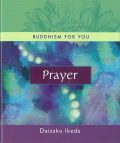The Persistence of Religion
Pinpointing the causes of conflict and the rise of radical religious factions as being poverty and disrespect of individuals, their countries and their cultures, Cox and Ikeda recommend a return to universal values underpinned by the recognition of human dignity and kindness—or, depending upon the author’s perspective, the presence of God in all and Christian love or inherent Buddhahood and compassion. In order to position human dignity and kindness as the core value of our lives, we need to undertake altruistic action for the happiness of others and strive towards the eradication of social injustice. In dialogue, universal values impart the humility and willingness to listen to others and, says Cox, whatever our worldview, “the frank recognition that we could be mistaken.” These three things help lessen the causes of conflict. Ikeda later supports this idea, stating that two of religions most important roles are “restoring human ties and making local communities, and society more generally, warmly humane.”
In stock






